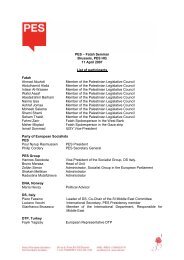Hedge funds and Private Equity - PES
Hedge funds and Private Equity - PES
Hedge funds and Private Equity - PES
You also want an ePaper? Increase the reach of your titles
YUMPU automatically turns print PDFs into web optimized ePapers that Google loves.
finance infrastructure through long-term investment programmes. This is a clear example of how<br />
the short-term strategies of private equity <strong>funds</strong> <strong>and</strong> the long-term development of infrastructure<br />
operators are in direct conflict. Furthermore, it is to be expected that private equity <strong>funds</strong> leave<br />
infrastructure operators in a condition where their capabilities for pursuing their long-term objectives<br />
have been severely weakened.<br />
Employees’ pension fund investments are also major concerns. Investors in this sense are<br />
defined as being ‘ordinary’ retail investors such as collective investment scheme investors,<br />
pension scheme beneficiaries (<strong>and</strong> their agents such as trustees), <strong>and</strong> insurance fund policyholders.<br />
While the expert report from the European Commission argued that investors would<br />
gain added value by investing in hedge <strong>funds</strong>, alternative investment <strong>funds</strong> in the form of structured<br />
products have the potential to offer ordinary retail investors a product with a return that<br />
would be between bonds <strong>and</strong> equities on the risk spectrum. However, all in all it is not clear that<br />
hedge <strong>funds</strong> offer such added value potential for investors <strong>and</strong> therefore it is not clear why retail<br />
investors should have access to these <strong>funds</strong>. While it is difficult to identify the benefits of retail<br />
investors entering the market of hedge <strong>funds</strong>, it is easy to point to the problems. Lack of transparency<br />
<strong>and</strong> disclosure – even when it comes to basic operations of alternative investment <strong>funds</strong>,<br />
is just to mention one aspect.<br />
Finally, the stability of financial markets is not the least of our concerns. Six factors have been<br />
presented as potentially impediments to the financial stability of the overall market. The industry’s<br />
growth <strong>and</strong> the extensive use of performance fees are likely to go h<strong>and</strong> in h<strong>and</strong> with increased<br />
competition <strong>and</strong> risk taking. Sometimes the incentive is just too big, pushing hedge fund<br />
managers to take unnecessary risks. The amount of assets under management has become<br />
more significant, <strong>and</strong> a hedge fund failure with the same amount of assets under management<br />
as a traditional fund may have a far greater market impact. In the light of the current size of assets<br />
under management, there can be little doubt that some hedge <strong>funds</strong> – using strategies such as<br />
short selling – can influence prices independent of fundamentals <strong>and</strong> cause financial instability.<br />
A key concern regarding hedge fund <strong>and</strong> financial market stability is related to increasing similarities<br />
or correlation among hedge fund strategies. In addition to increasing correlations,<br />
observers have stressed that the liquidity of many hedge fund investments may be decreasing.<br />
We have argued that a boom in leverage <strong>and</strong> risk may go unnoticed, because the boom is originating<br />
from markets characterised by great opacity, e.g. the market for credit derivatives. Finally<br />
regulators are finding themselves in a vacuum where they are unable to react, as they are placed<br />
in a situation with an enormous lack of transparency <strong>and</strong> reliable data. This means that it is<br />
extremely difficult to make informed decisions about financial threats. So we believe that hedge<br />
<strong>funds</strong> create substantial threats to the global financial stability.<br />
Coherence <strong>and</strong> co-responsibility are threatened by the extreme management fees <strong>and</strong> remuneration<br />
of partners within the HF <strong>and</strong> PE industry.<br />
All the issues raised in this part of the report challenge the achievement of the Lisbon goals.<br />
More precisely, what are the perspectives in terms of innovation, Research <strong>and</strong> Development,<br />
new technologies, development of infrastructures <strong>and</strong> networks if the real economy is eaten, bite<br />
by bite, by financial market operative models? Our European economies need resources, brains<br />
<strong>and</strong> the means to function <strong>and</strong> develop in our globalised environment. How will we build on the<br />
future if the creation of wealth goes to very few, to the detriment of the many? We have to reconcile<br />
long-term needs of businesses <strong>and</strong> societies in general with the short-termism of more <strong>and</strong><br />
more investors, prominently among them alternative <strong>funds</strong>. While promoting investments has<br />
always been a credo of the Lisbon agenda, not all investments are productive <strong>and</strong> those that are<br />
clearly destructive must be prevented.<br />
Part II – Six concerns about our European social market economy<br />
149




